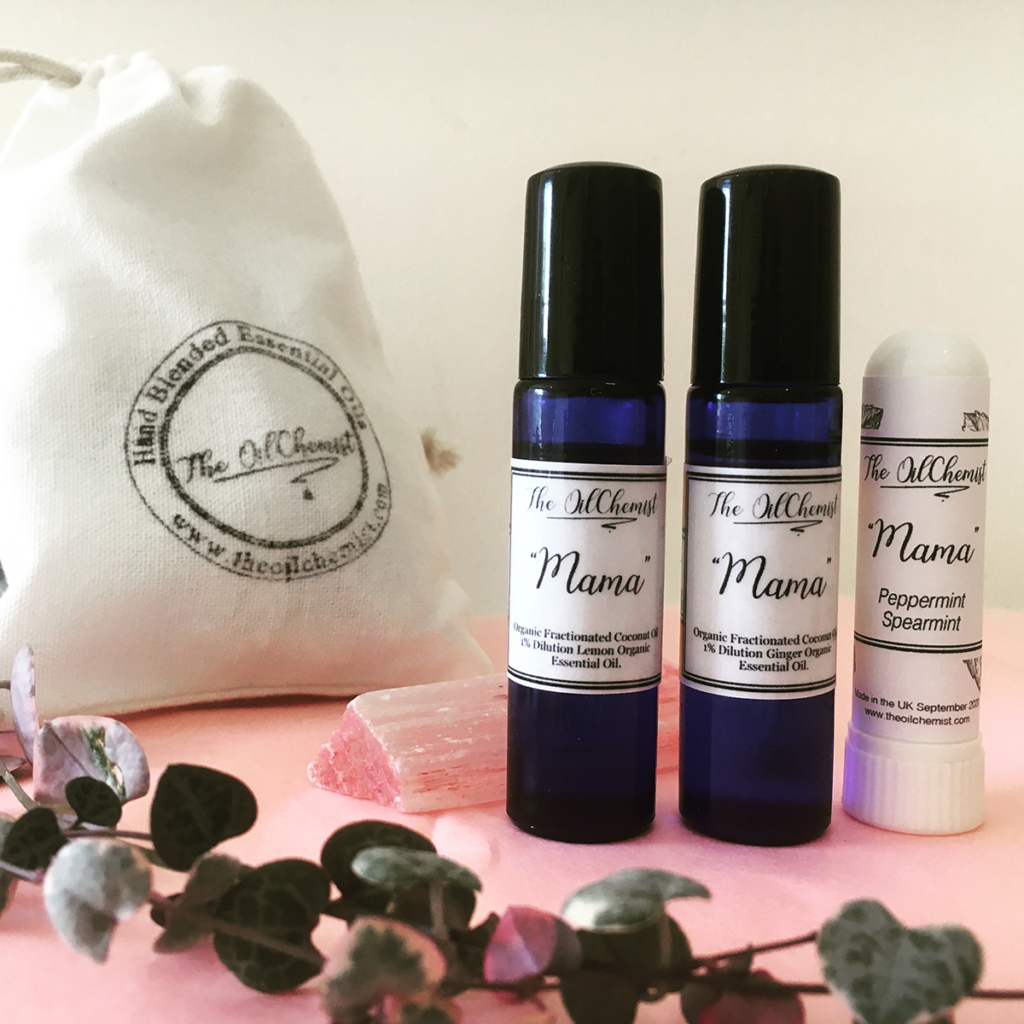
To err on the side of caution one should avoid using essential oils during the first trimester. However having said that, there are exceptions to the rule as this is often the time when the new mother is really experiencing morning sickness and essential oils have proven benefits.
In the first trimester one should focus on on the inhalation of essential oils to help morning sickness and vomiting rather than topical application. Alongside inhalation via a diffuser or personal inhaler, dilution is the key to getting the benefits of essential oils. Dilution is the key.
Regardless of whether you’re pregnant or not, if you do decide to use oils topically, you’ll need what’s known as a carrier oil to do so safely. This is because essential oils are very concentrated and can irritate skin when applied directly without being diluted.
Common carrier oils include:
- jojoba
- coconut
- sweet almond
- apricot
Pregnant women should always speak with their physician or homeopathic expert before attempting to use them topically. In the blends I have made for women who are suffering with extreme morning sickness and vomiting, the blend is 1%.
So this means that knowing Lemon and Ginger have proven to be effective in cases of morning sickness, in a 10ml roller of carrier oil ( I use fractionated organic coconut oil) we use just 5 drops of organic or wild-crafted essential oil.
A 2014 study in pregnant women showed that when used consistently in aromatherapy, LEMON essential oil reduced the frequency of nausea and vomiting. https://www.ncbi.nlm.nih.gov/pmc/articles/PMC4005434/
The roll on should be used very sparingly in the first trimester and then it can be used, if it is proving effective, more liberally after 12 weeks gestation.
GINGER essential oil is an effective and natural way to deal with a queasy stomach. In a 2012 meta-study, inhaling ginger and PEPPERMINT essential oils were shown to decrease the severity of nausea, the frequency of nausea episodes, and reduce the need for patients to take anti-nausea drugs.1
Other safe essential oils to use:
Lavender
Of all the essential oils, lavender is one of the most well researched and most promoted options that is also widely available for pregnant women to use. Studies, including this one from 2016 ( Link to PDF ) have shown that when used properly, lavender is an excellent aromatherapy treatment that encourages relaxation, especially during labor and delivery — a stressful moment.
A 2018 review of studies even boldly concluded that lavender reduces labor pain.
Taking a portable diffuser with you to the hospital and adding a few drops of pure lavender oil is sure to help and set a relaxing mood for not only mama but for everyone else involved too .
N.B. Avoid inhaling the steam directly from your diffuser though as this can cause irritation to the mucous membranes in your nose.
You might also ask your labour partner to massage you with diluted lavender oil during labour.
Peppermint oil
This is a controversial one as many experts — including aromatherapy and homeopathic practitioners — avoid the use of peppermint oil on pregnant women entirely.
But there’s preliminary evidence to suggest that when soley used in an inhaler or in a diffuser, peppermint oil can be a great option for reducing nausea in pregnant women. I personally recommend a blend of spearmint and peppermint for use in an inhaler (the portable option as a diffuser at work etc is not always possible, ) for after the first trimester.
Geranium oil
There’s no shortage of anti-anxiety aromatherapy options for labor and delivery. If lavender and rose oil aren’t your things, geranium oil is another floral option with a proven clinical track record of reducing anxiety during the first stage of labor.
In your second or third trimesters, keep the following safety protocols in mind when you’re using approved essential oils.
+DO NOT INGEST ESSENTIAL OILS at any point in your pregnancy. Even if you aren’t pregnant, essential oils aren’t meant to be taken orally unless under the direct supervision of an expert or physician. Many essential oils can pose toxicity risks when ingested —for you and potentially your baby. This goes against what many oil producing companies and their agents selling them will advise. These companies which operate on an MLM system do have an ingestable range but this is not the time for you to be taking them and even outside pregnancy they should only be used in very very small quantities.
Other oils
Additional essential oils that have therapeutic benefits and are safe for pregnancy (after the first trimester) include:
- argan
- patchouli
- pomegranate
- cardamom
- fennel
- cypress
- myrtle
- frankincense
I hope this has made the use of essential oils during pregnancy a little clearer and please remember I do make bespoke blends, so if you are needing help during any of the trimesters in this wonderful time of life, please do get in touch.

Pregnancy is really a time when you want to get in touch with nature and plants do provide us with the most wonderful of resources.
Kay.x
- Lua, P. L., & Zakaria, N. S. (2012). A Brief Review of Current Scientific Evidence Involving Aromatherapy Use for Nausea and Vomiting [Abstract]. The Journal of Alternative and Complementary Medicine,18(6), 534-540. doi:10.1089/acm.2010.0862
